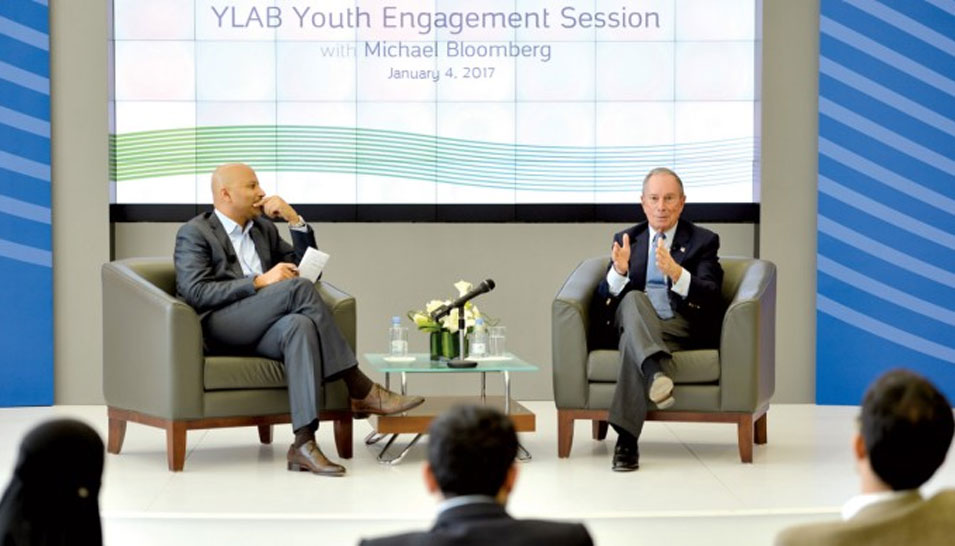
Michael Bloomberg speaks to young members of the Young Leaders Advisory Board as Yasser M. Mufti listens during a session at the UPDC in Dhahran. Bloomberg spoke about the importance of calculated risk and innovation in any successful business.
Last week, a group of Saudi Aramco’s young professionals had the opportunity to meet and speak to Michael Bloomberg, a former mayor of New York and founder of global media empire Bloomberg LP.
Bloomberg was making his first trip to the Kingdom to learn firsthand about the transformation of the country as part of Saudi Vision 2030. Visiting Saudi Aramco, which is a key component of Saudi Vision 2030, provided him with an inside look at the world’s largest integrated energy and chemicals enterprise.
As part of the visit, he met with some of the company’s young professionals, engaging them in a lively discussion, fielding questions from an audience that included past and present members of the Young Leaders Advisory Board, and young entrepreneurs participating in the Wa’ed entrepreneurship program.
Bloomberg’s visit was also his first to a major oil and gas company and included meetings with the company’s senior management and visits to the Oil Supply Planning and Scheduling Department, the Exploration and Petroleum Engineering Center, the Upstream Professional Development Center (UPDC), the King Abdulaziz Center for World Culture, and the Shaybah Production Department.
The visit comes at a time of transition as Saudi Aramco moves toward a potential initial public offering and as the Kingdom maps out a National Transformation Program aligned with Saudi Vision 2030.
A Culture of Innovation, Calculated Risk

Michael Bloomberg, front, eighth from left,
poses with Yasser M. Mufti, executive
director of New Business Development,
front, ninth from left, and young Saudi
professionals, including past and current
members of the Young Leaders Advisory Board.
While sharing his own experience about taking big risks and the growth of his company from a start-up to a must-have for financial investors, he highlighted Saudi Aramco’s innovative culture, and its support for issues of broader concern such as reducing carbon emissions. He described how he took an innovative idea — using new computer technology to allow businesses and investors to study financial data — and helped to transform the financial industry in the United States. He encouraged young Aramcons to look for ways to innovate in the workplace, even if it means taking risks.
“In a company like Saudi Aramco — which seems to me as an outsider to be a company that stays ahead of technology and has been a real innovator — it looks to me like it allows innovation and rewards people who run risks,” Bloomberg said.
“I’ve always tried to do this at Bloomberg. If you try something and it doesn’t work, but a rational person would have taken that opportunity, based on the facts and the opportunities, I want to make sure that everybody in my company knows that I consider you a success, not a failure. As the saying goes, ‘Nothing ventured, nothing gained,’” he said.
From the Center to the Rub’ al-Khali
In a meeting with senior management, Bloomberg learned about the company’s strategy and its role as part of Saudi Vision 2030 as well as the business and investment environment in the Kingdom. In a meeting with senior management, Bloomberg learned about the company’s strategy and its role as part of Saudi Vision 2030 as well as the business and investment environment in the Kingdom. Bloomberg also heard a presentation from Johns Hopkins Aramco Healthcare and the progress it has made over the past three years. Bloomberg has previously donated generously to Johns Hopkins.
During his visit to the King Abdulaziz Center for World Culture, Bloomberg was briefed about Saudi Aramco’s citizenship and social responsibility programs and initiatives. It also provided an opportunity for him to speak about Bloomberg Philanthropies, which focuses on five key areas: public health, environment, education, government innovation, and arts and culture.
Bloomberg concluded his visit to Saudi Aramco with a visit to Shaybah, where he witnessed the scale of the company’s operations in the Rub’ al-Khali, or the Empty Quarter. He also took time to watch the sunset from the top of the sand dunes in Shaybah and was then hosted to a traditional Arabic dinner by Saudi Aramco president and CEO Amin Nasser.